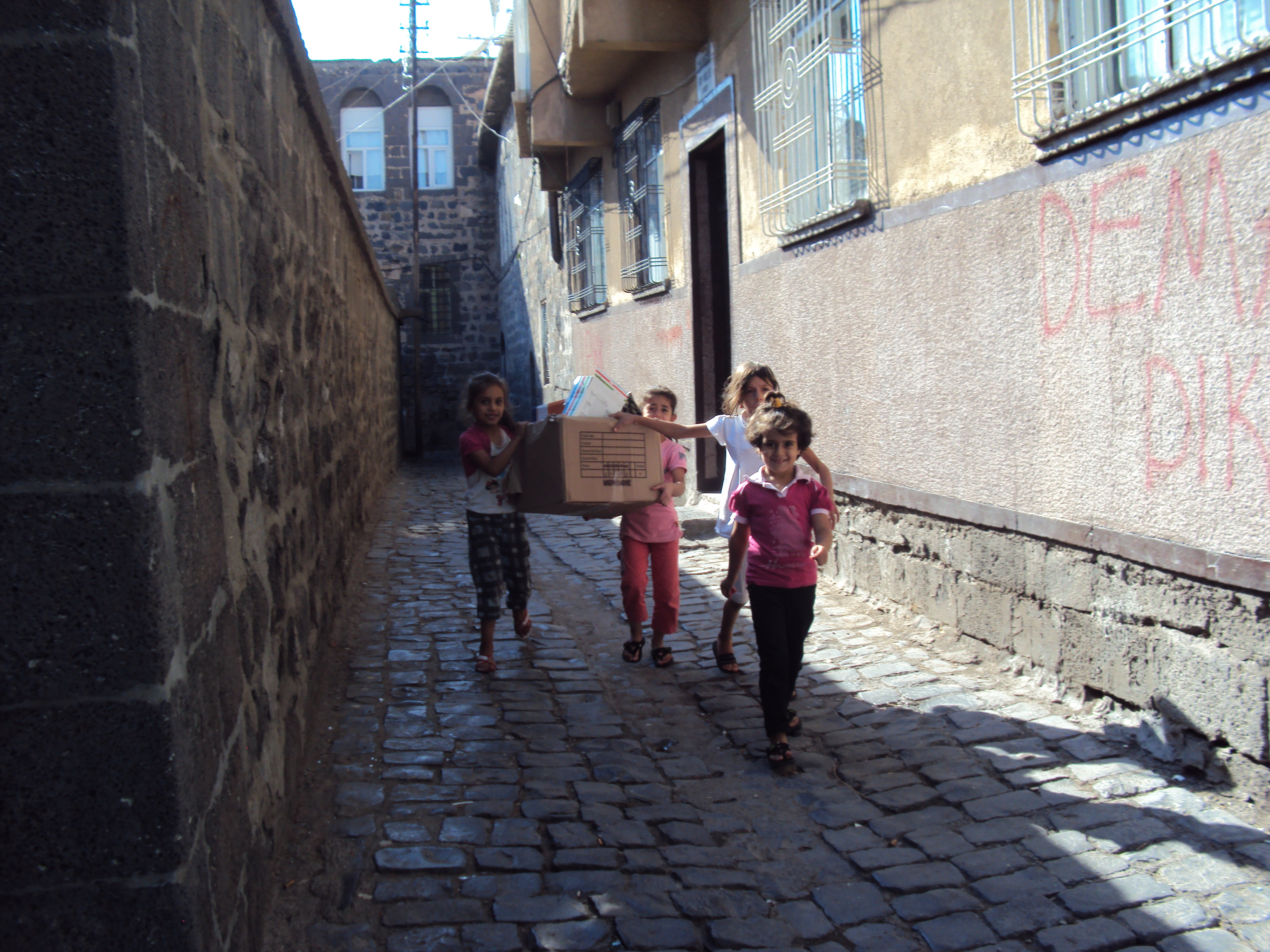Destination Amed: Diaries from home; On our first day in the city, we step out to get some breakfast before our guided tour around the city. Though it’s early, the weather is already hot, and having travelled from freezy Bergen, we enjoy the heat. We find a nearby çaxane where people are sitting outside smoking, and we walk in. – Têşt? Arê, sipas. Keremkên! In a matter of minutes our table is filled with yoghurt, honey, different types of cheese and of course lots of tea. And so our journey in Amed begins. We are home.
We walk around town, and arrive at the ancient city walls of Amed, built by Constantius II in 349 b.c. Made out of black basalt it forms a 5,5 km circle around the old city, and is the second largest city walls in the world after China’s Great Wall. As we walk on top of the wall there’s an impeccable view of not only the wall as it curves ahead of us, but also the two realities of Amed: on the right is a green park lighting up the area, families enjoying picnics and shops like pearls on a line. The actuality is opposite on the left with slum-like neighbourhoods, derelict homes and clusters of poorly dressed children. As we stand there with these two different realities in front of us, I can’t help but notice a strange feeling as our guide points out that the poor neighbourhoods are Kurdish.
Amed is beautiful. It’s not a picture perfect scenario that meets us, but it’s soothing because I sense that we belong. We’re surrounded by Kurds and I can hear Kurmancî being spoken on every little corner. To me, that’s what I miss the most as a Kurd that lives in diaspora. We capture every movement and building we come across, whether it’s ramshackled or new, and talk to everyone willing: from the neighbourhood baker, the elderly women in the alley, the kids playing in the mosque yard, and Armenians in the churches, they tell us their stories and we bond. Despite our many heartfelt laughs, we’re reminded of the locals’ harsh reality as military vehicles such as tanks and heavily armed police roam the streets. During the time we’re there the AKP government is scheduled to announce its so-called democratization package, and the presence of the police forces are intensified. When the news is publicized everyone is disappointed, and point out the government’s lack of dialogue. Although we don’t witness any resistance when we’re out, the escalation the military forces indicate that it’s expected. The camera surveillance is everywhere, from the hotel to the streets. And the feeling sneaks upon on me, as I try to explain their presence to the Europeans in our group.
I love Amed, but it’s an enigma. We say we’re in the capital of Bakur, but have a picture of ataturk in our hotel’s front desk. We see taggings of PKK, Öcalan, HPG and azadî on every neighbourhood wall, but see the turkish flag on every building. We buy Kurdistan football t-shirts as turkish police men with machine guns walk on the street behind us downtown. I don’t want to feel unsafe, but the one time some of us girls get lost we don’t ask anybody for help, because you never know what it might turn into. And there it is again, that feeling. It’s bitter, and I recognize it oh so well, having spent a lifetime as a Kurd outside of Kurdistan. The feeling of despair. The feeling of helplessness. We make sure our friends that travel with us know the truth about what is happening around us, but we know better than to risk anything. A few times we meet with government representatives as part of our project I skip out. I can’t come to terms with the thought of sitting under the turkish flag and listen to their lies about how wonderful their country is. It’s our country. I later get to hear how my friends ask them questions that make them squirm in their seats, and how one tells the governor “Kurdistan greets you”. The severity of this action becomes sky high as two of the governor’s guards pull her aside afterwards to notify her that the governor would like to speak to her alone. We make sure that doesn’t happen, but the news of this incident make its way back to the hotel before we do, and later on we find them at our hotel during our last day of classes.
I want to remember Amed as a destination where new friendships were made and where we learned invaluable lessons from people in the bazaar, as well as our meeting with mayor Abdullah Demirtaş from the Peace and Democracy Party, BDP. His speech was thought provoking, as his act of speaking to us in Kurdish was a felony in itself according to turkey’s laws. I want to remember the innocence of the kids we meet in the alleys that rejoiced over the pictures we took of them. How they laughed with all their heart as they recognized themselves and the places we’d photographed. I want to remember the sweet Armenian man from the Surp Giragos/ St. Giragos church – the largest in the Middle East – that let us interview him. I want to remember the hospitality of the shop owners that danced govend with us while throwing confetti in the air. I also want to remember how our non-Kurdish friends helped us understand Kurdistan in a new-fangled way because of their questions, curiosity and interest in our surroundings. How do you even begin to explain to others how Kurds are? I think they got a good taste. After all, they left Amed a little more Kurdish than they were when they arrived.
[alpine-phototile-for-flickr src=”set” uid=”90131314@N06″ sid=”72157637057142993″ imgl=”fancybox” style=”bookshelf” row=”4″ size=”100″ num=”20″ shadow=”1″ highlight=”1″ align=”left” max=”100″ nocredit=”1″]

